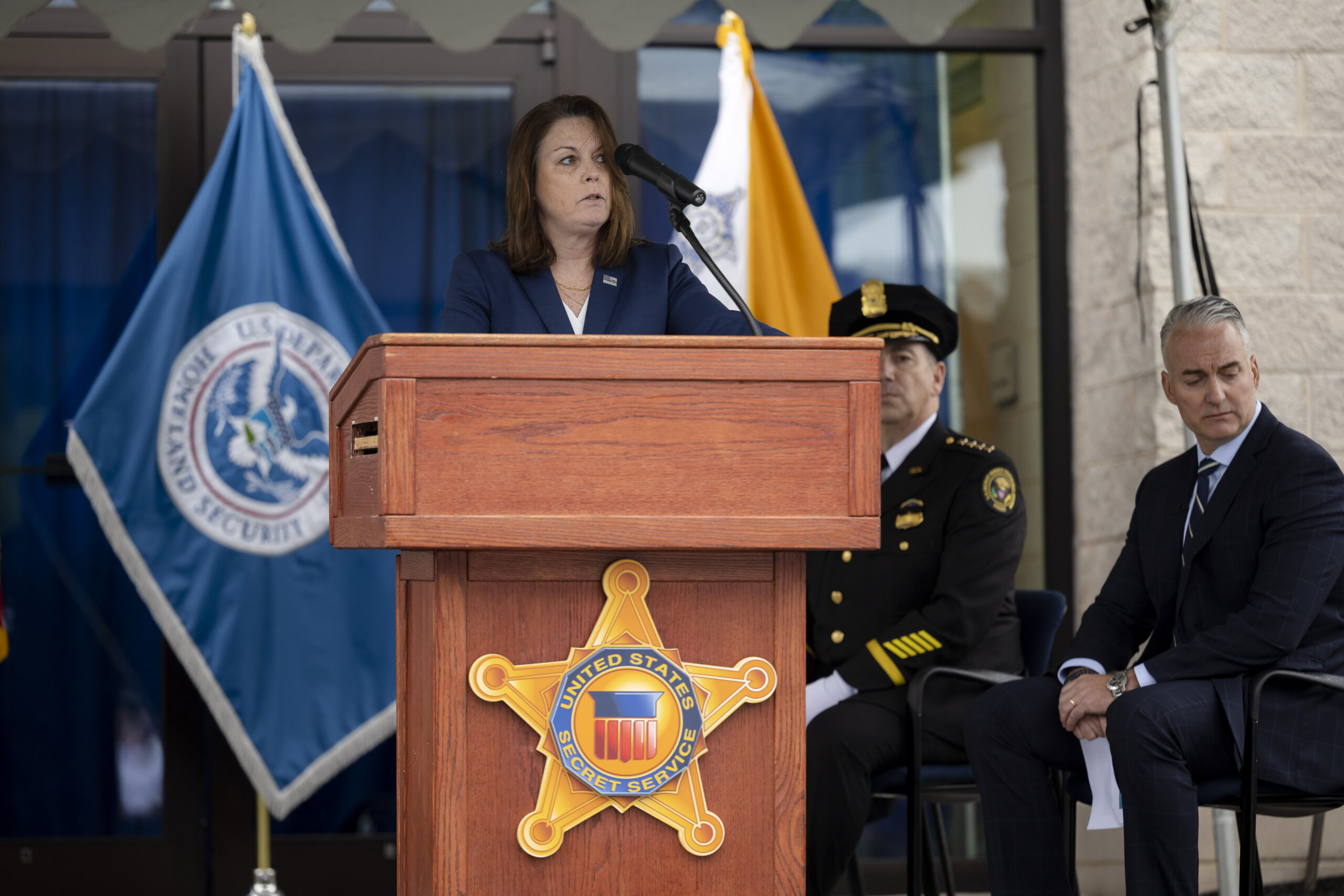Executive
Secret Service Chief Faces Mounting Pressure To Resign
Director Kim Cheatle of the U.S. Secret Service faces mounting pressure to resign following revelations of a culture of negligence.

New allegations that Secret Service training resources were reallocated to “executive leadership bonuses” and DEI-prioritized recruitment are among the torrent of charges leveled against agency Director Kim Cheatle and other top officials in the aftermath of the assassination attempt against Donald Trump.
Secret Service director dares appear at RNC – and this did not go well
Inside the main hall of Milwaukee’s Fiserv Forum, Republicans Thursday night were enjoying a Make America Great Again lovefest. But on the outside perimeter of the convention center, anger was still spewing over an avalanche of negative information about the layers of Secret Service failures that led to a bullet piercing Trump’s right ear, just millimeters away from killing him, four days ago at a rally in Pennsylvania.
Two GOP senators angrily confronted Cheatle, running her down when she refused to answer their repeated questions.
“This is exactly what you were doing today on the call – stonewalling,” Sen. John Barrasso, a Republican from Wyoming, fumed at Cheatle as she walked sternly without speaking, a tall male Secret Service agent by her side.
“This was an assassination attempt!” stormed Sen. Marsha Blackburn, a Tennessee Republican. “You owe the people answers. “You owe President Trump answers.”
A tight-lipped Cheatle continued to walk briskly away.
Afterward, Blackburn and Barrasso posted a video on Twitter recounting the confrontation and reiterating their calls for answers and for Cheatle’s resignation.
“I’ve got a message for her, she can run but she cannot hide because the American people want to know how an assassination attempt was carried out on President Donald Trump,” she declared.
Fresh allegations against the Secret Service
Allegations leveled against the Secret Service over the last 24 hours include:
- A Secret Service special agent or officer was assigned to the building rooftop where Thomas Matthew Crooks fired off the shots but never showed up for work that day.
- The explanation Cheatle provided for the unmanned rooftop – that she had placed agents and/or officers inside the building because the “slope” of the roof posted a physical danger – was nonsensical because there was a similar rooftop nearby where two counter snipers were positioned.
- Four Secret Service snipers were present at the Pennsylvania rally, but only two of them were from the highly trained Secret Service ranks. The other two, who were responsible for firing the shots that killed Crooks, were local law enforcement officers.
A petition on change.org calling for Cheatle to resign was blocked and placed under review. When the petition was shut down Tuesday, it was just a few hundred signatures shy of reaching its goal of 10,000. (Hours after RCP on X.com publicly questioned the move as a potential example of censorship, the petition was restored.)
More allegations – and the denials ring hollow
The revelations and serious allegations piled up Wednesday, with more lawmakers calling for Cheatle’s resignation after the director held a telephone briefing for senators on the security failures. On the call, senators learned that law enforcement had flagged Crooks for suspicious behavior more than an hour before he fired shots at Trump. The agents and officers noticed that Crooks was holding a rangefinder and was wearing a backpack. Counter snipers spotted Crooks 20 minutes before the shots rang out.
Sen. Barrasso talked to reporters after the briefing, reiterating calls for Cheatle to resign and complaining that Cheatle shut down the telephone briefing after just a couple of questions and “didn’t get into the meat of the matter.” Several senators, including Marsha Blackburn, Ted Cruz, and Mike Lee, remained in the queue, never getting their questions answered, The Federalist reported on X.com.
“So far, they’re flooding us with details that aren’t helpful,” Sen. Lee, a Utah Republican, said in an X.com post before the briefing ended. “I have yet to hear them substantively address the failures that led to this tragedy.”
Senators on the call also learned that the Secret Service was aware of a “potential threat” 10 minutes before Trump took the stage in Pennsylvania but let him go out anyway. That revelation outraged many senators, including Blackburn, who told reporters she was “appalled to learn the Secret Service knew about a threat prior to President Trump walking on stage.”
No confidence
“I have no confidence in the leadership of Director Cheatle,” she added, “and believe it is in the best interest of our nation if she steps down from her position.”
The briefing for senators occurred after Cheatle failed to provide a promised Tuesday briefing for House Republicans on the Oversight Committee. Rep. James Comer, who chairs that panel, issued a subpoena Tuesday for Cheatle to appear for a hearing on Monday.
The petition calling for Cheatle’s resignation cited her support for a “30×30 pledge,” which aims to reach at least a 30% female workforce by 2030. The pledge is part of a national drive adopted by various law enforcement agencies across the country and one Cheatle has openly and enthusiastically backed.
“Although Director Cheatle’s goal may have good intentions,” the petition stated, “unfortunately her misguided agenda has employed methods that have apparently resulted in female candidates not being vetted.”
The petition also cited manpower shortages due to attrition driven by heavy workloads and low worker morale, as well as “selective promotion practices” during Cheatle’s tenure as director that aren’t merit-based. It said the agency is struggling with insufficient training funds while resources are being “reallocated” for recruitment, promotional testing, and executive leadership bonuses.
An earlier incident went unpunished
The petition detailed allegations that Cheatle and others in the agency’s “executive leadership” resisted taking appropriate investigative or disciplinary action for “blatant misconduct” by a female agent who had received poor performance reviews and then accused her supervisor of sexual harassment.
That superior allegedly filed a whistleblower complaint, which resulted in disciplinary action being taken against the female agent in question, according to a copy of an internal Secret Service memo dated Jan. 19, 2024, and obtained by RealClearPolitics.
Questions also are swirling around the agency about why its snipers didn’t shoot Crooks until after he fired on Trump.
One source in the Secret Service community said the agency has long taken an overly measured approach when it comes to firing on suspicious activity or people – even when they are armed.
In the fall of 2014, the Secret Service faced a crisis after several disciplinary problems and security lapses, including fence-jumpers making it inside the White House. Ralph Basham, a former Secret Service director from 2003-2006, a 30+ year veteran of the agency, and a former director of the Federal Law Enforcement Training Center, testified at a September 30, 2014, House Oversight Committee hearing.
Under questioning from lawmakers, Basham tried to explain why the Secret Service has a resistance to shooting first unless they can be fairly certain a suspicious person is a direct threat to the president or other protectees.
In the old days…
“So, there’s a lot of things going on in the Secret Service’s head, I am sure, when we have an intruder like that,” Basham said. “But I just have a real – well, I think I am out of time. But I will say, in 1976, there was an individual who came over the [White House] fence, apparently was carrying some type of device that was – appeared to be a weapon, but turned out to be a pipe, and they shot him. And there was criticism for that shooting in 1976. This is a difficult, difficult balance to strike.”
“That has contributed directly (among many other things) to the hesitation to shoot first,” the source said. “Also, note that [the 1976] incident was the first time I am aware of when a counter sniper fired on someone.”
“We don’t need a director who creates a culture where counter snipers and others have to be unreasonably concerned about ‘striking a balance,’” the source continued. ”We need to be trained, and then get a transformational leader who will back you if you followed your training.”
This article was originally published by RealClearPolitics and made available via RealClearWire.
Susan Crabtree is a political correspondent for RealClearPolitics. She previously served as a senior writer for theWashingtonFree Beacon, and spent five years asa White House Correspondent for theWashington Examiner.
-

 Accountability3 days ago
Accountability3 days agoWaste of the Day: Principal Bought Lobster with School Funds
-

 Constitution2 days ago
Constitution2 days agoTrump, Canada, and the Constitutional Problem Beneath the Bridge
-

 Executive1 day ago
Executive1 day agoHow Relaxed COVID-Era Rules Fueled Minnesota’s Biggest Scam
-

 Civilization5 hours ago
Civilization5 hours agoWhy Europe Shouldn’t Be Upset at Trump’s Venezuelan Actions
-

 Civilization1 day ago
Civilization1 day agoThe End of Purple States and Competitive Districts
-

 Christianity Today5 hours ago
Christianity Today5 hours agoSurprising Revival: Gen Z Men & Highly Educated Lead Return to Religion
-

 Civilization5 days ago
Civilization5 days agoThe devil is in the details
-

 Executive4 days ago
Executive4 days agoTwo New Books Bash Covid Failures








